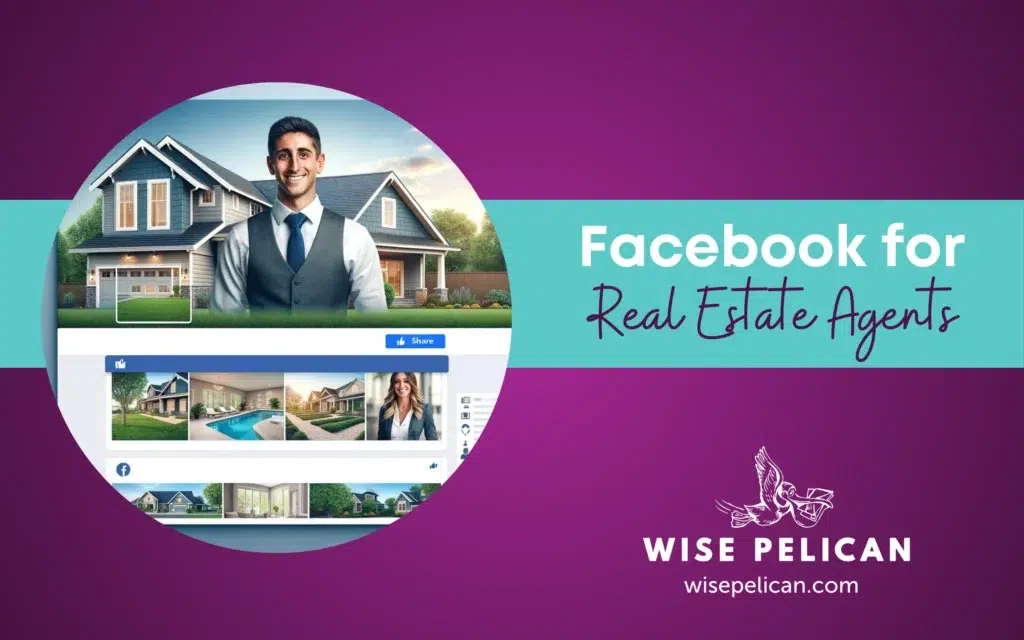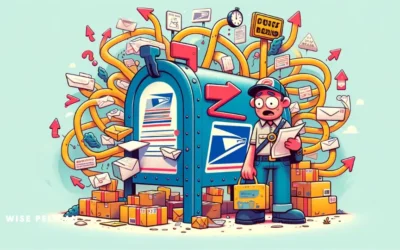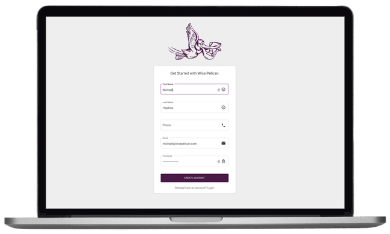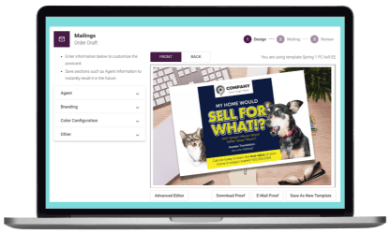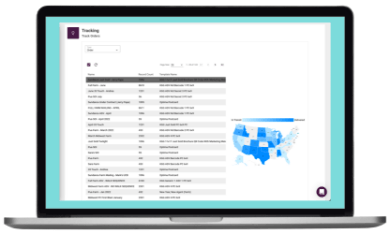Prefer watching a video on Facebook for real estate agents?
We have included our YouTube video if you would prefer to watch a video on Facebook for real estate agents.
Facebook is a powerful tool for real estate agents, offering many opportunities to connect with potential clients and grow your business.
Whether you have a substantial advertising budget or none at all, Facebook for real estate agents can be a game-changer for your career.
Let’s explore how real estate agents can use Facebook’s potential to boost their presence, connect with prospects, and ultimately generate leads and clients.

Facebook for Real Estate Agents: It’s Free
Facebook is full of opportunities for real estate agents, and one of its most appealing aspects is that it is free to use.
While paid advertising on Facebook can provide a significant boost, it is by no means a prerequisite for success on this platform.
With the proper methods and some effort, you can maximize Facebook without spending any money. Let’s discuss some simple but powerful tricks to help your real estate business.
With its vast user base and diverse demographic, Facebook presents an invaluable resource for real estate agents seeking to expand their reach and grow their business.
Real estate agents can maximize Facebook for marketing by using clever tactics and devoting time and effort to building a solid online presence. This includes creating interesting posts, interacting with followers, and joining groups related to real estate.
Doing this helps build trust and connections with potential buyers and sellers. Using Facebook’s analytics can give agents helpful information about what their audience likes to improve their strategies and make their messages more effective.
The secret to doing well on Facebook for real estate agents is to be proactive, consistent, focused on real interaction, and give people something worthwhile to engage with. Let’s discuss some simple tips to help your real estate business grow!

Connecting With Your Audience on Social Media
Consistently engaging with other users’ posts on social media platforms such as Facebook offers an invaluable opportunity to reconnect with your network and reinforce your professional identity.
When you like and comment on posts from friends, coworkers, and people you know, you remind them that you’re around and make them curious about what you’re up to. This ongoing interaction helps them remember you and may make them interested in what you’re doing professionally.
This approach is a gentle yet effective way to maintain visibility and stay top-of-mind among your contacts. Each like and comment is a mini digital handshake, reinforcing your relationships and keeping the lines of communication open. Whether acknowledging a friend’s achievement, offering encouragement, or sharing insights related to your field, these interactions build a sense of camaraderie and rapport within your network.
When you engage on Facebook by liking and commenting on posts, you reintroduce yourself to your network and stay visible online. Regularly engaging with others’ content keeps you on people’s radar, making them curious about what you’re up to professionally. This ongoing interaction strengthens relationships and shows you’re an active community member.
Sharing others’ content is a way to complement another person’s knowledge. Thinking outside of real estate, how do you feel when someone compliments you? It makes you feel good and possibly makes you like that person a little bit more than you already did. Sharing posts from other Facebook users has that same effect.
So, take the chance to reconnect with your network through meaningful engagement on social media—it’s a small action that can have significant benefits in staying visible and building professional relationships.
Ideas for posts
- Local Market Updates: Provide insights and analysis on your area’s current real estate market trends.
- Home Improvement Tips: Share tips and ideas for home improvement projects, staging, or landscaping.
- Neighborhood Spotlights: Feature different neighborhoods or communities you serve, including local amenities and attractions.
- Real Estate News: Share articles or blog posts about industry news, regulations, or developments.
- Behind-the-Scenes: Give followers a glimpse into your day-to-day activities as a REALTOR, such as property tours or client meetings.
- Real Estate Infographics: Share visually appealing infographics with statistics or tips about buying or selling homes.
- Community Events: Promote upcoming local events or fundraisers to engage with your audience and show your involvement in the community.

Sharing the Real Estate Experience
Utilizing video content allows you to share your real estate journey on Facebook. This can be a highly impactful strategy that resonates deeply with your audience.
When visiting properties with clients or checking out listings by yourself, recording these moments on video gives a unique look into your daily life as a real estate agent. What’s great about this is you don’t need fancy gear or editing skills to make interesting videos. Being authentic and spontaneous often produces the best content.
Rather than just showing property tours, try making selfie-style videos where you talk about your thoughts and feelings while you’re there.
These personal touches in your social media give clients important background information, make your business feel more human, and show the real you behind your real estate skills.
You don’t have to be perfect or super polished in these videos – what counts is being genuine. Embrace your imperfections and quirks; they make your videos more charming and relatable, helping you connect better with your viewers and potential clients.
When opportunities arise, such as when you are out with a client, seize the moment to capture quick selfie videos that offer snippets of your interactions and experiences. Include your clients in your videos. This shows how much your clients like you and that you are knowledgeable about real estate. These spontaneous moments provide insight into the collaborative nature of your client-agent relationships.
Don’t get caught up in trying to be perfect – the great thing about this is its natural and unedited feel. Trust yourself, capture the moment as it is, and confidently share it with your audience. It’s not about making everything flawless; it’s about showing your real estate journey honestly and inviting your audience along. Use video to let your personality and passion for real estate shine – it’s a great way to connect with people and get them involved on Facebook.
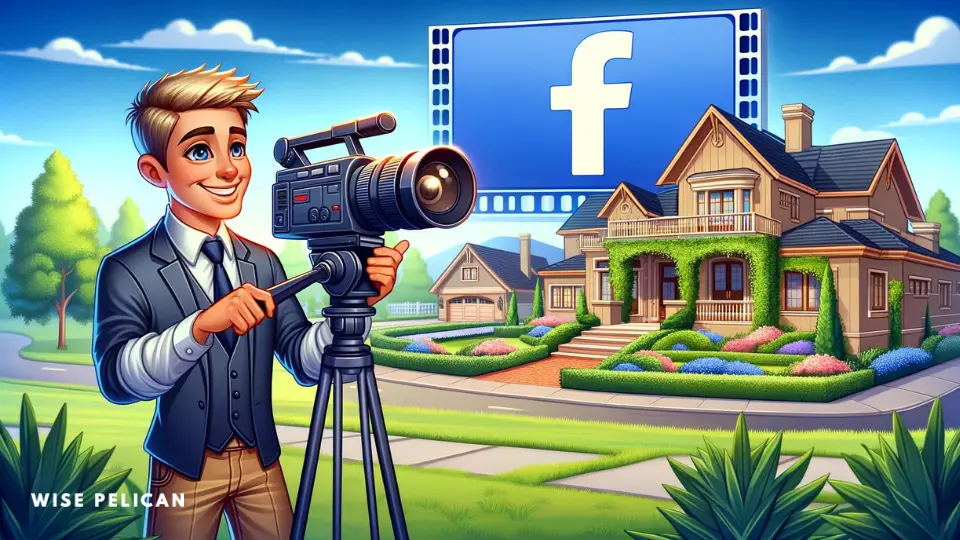
Why Videos Matter for Real Estate Agents on Facebook
Video content is essential on Facebook for real estate agents. Embracing this trend isn’t just helpful—it’s necessary for standing out and effectively engaging with your audience.
Videos provide a versatile platform for sharing information, showcasing properties, and building genuine connections in ways that static images or text simply can’t replicate. They offer a captivating visual and auditory experience that draws viewers in, allowing them to explore properties firsthand and immerse themselves in real estate, regardless of location.
What sets video content apart is its ability to evoke emotion and build rapport with your audience. By showing your personality, expertise, and passion for real estate through video, you create a sense of authenticity and trust that resonates deeply with viewers. Whether you’re providing market insights, offering virtual property tours, or sharing personal anecdotes related to your real estate journey, each video serves as an opportunity to engage and connect with your audience on a deeper level.
It can not be stressed enough that perfection is not the goal of video content. In fact, the most engaging videos are often raw, unscripted, and authentic. Embrace imperfections and spontaneity, as they add charm and relatability to your content.
As you integrate video into your content strategy, maintaining a healthy balance between real estate-related content and other topics is vital to keeping your audience engaged and interested in your life beyond real estate.
Aim to post at least four times a week, with one post focusing on real estate and the remaining three covering various non-real estate subjects. This diversity prevents monotony and allows you to showcase different facets of your personality and interests, making you more relatable and memorable to your audience.
Using video on Facebook can boost your real estate marketing and strengthen connections with your audience. By taking advantage of video’s benefits, staying authentic, and balancing your content, you can capture your audience’s attention and keep them engaged, driving success in your real estate business.

Ideas for Video Content on Facebook
There are several effective ways on Facebook for real estate agents to use video. Let’s take a look at a few of them.
Stunning Property Showcases
Share photo albums or virtual tours of your listings, highlighting each property’s unique features and amenities.
Success Stories
Post testimonials from satisfied clients or photos of recently sold properties to showcase your track record and expertise.
Local Market Insights
To keep your audience informed and engaged, provide valuable updates on the real estate market, neighborhood spotlights, and tips for buyers and sellers.
Live Q&A Sessions
Host live question-and-answer sessions where you can interact directly with your audience, address their queries, and provide personalized advice.
Virtual Open Houses
Organize virtual open house events where viewers can explore properties from their homes, encouraging engagement and interest in your listings.
Behind-the-Scenes Glimpses
Share behind-the-scenes photos and videos of your work, team outings, or community involvement to humanize your brand and connect with your audience personally.
Educational Content
Offer informative videos on topics related to real estate, such as home-buying tips, staging advice, or mortgage insights.
Client Testimonials
Include videos of satisfied clients sharing their testimonials to showcase the positive experiences others have had working with you.
Community Events
Create videos highlighting upcoming local events, festivals, or attractions in your area to demonstrate your knowledge of the community and provide added value to your audience beyond real estate.
For example, you could have a monthly feature piece where you visit a part of your community. Some ideas are your local farmer’s market, a high school football game, or volunteering at a food bank. The more people learn about you, the more you become the real estate agent they will use.
Expanding Your Reach to Instagram
The interconnected nature of social media platforms offers real estate professionals a unique opportunity to maximize their online presence and reach a wider audience.
By connecting your Facebook and Instagram accounts, you can utilize Facebook’s extensive influence to increase your reach on Instagram, ensuring a seamless and cohesive experience for your audience across both platforms.
This synchronization enables you to streamline your content distribution process, ensuring that your posts are seen by a broader audience and increasing your chances of engagement and interaction.
When posting on both platforms simultaneously, it’s important to remember that the content you share doesn’t need to be extraordinary or meticulously curated. Everyday experiences, such as discovering a new restaurant, attending a community event, or encountering interesting artwork, can offer valuable insights and perspectives to your audience.
By sharing these moments authentically and consistently, you showcase your personality and interests and demonstrate your commitment to staying engaged and connected with your community.
Consistency is vital for maintaining a solid social media presence. When you consistently share content that your audience connects with, you boost your visibility and stay in the minds of potential clients. Whether you share real estate tips, showcase local attractions, or just share bits of your daily routine, every post helps build trust and familiarity with your audience.
Take advantage of the connection between social media platforms and use Facebook’s influence to boost your presence on Instagram, one post at a time.

The Significance of LinkedIn
Each social media platform serves a distinct purpose, catering to different audiences and objectives. While Facebook and Instagram offer expansive reach and engagement opportunities, LinkedIn stands out as a professional networking platform tailored for industry experts and professionals.
LinkedIn offers a unique opportunity for real estate agents to establish credibility, build connections, and showcase their expertise.
Unlike the more casual and lifestyle-focused content typically found on Facebook and Instagram, LinkedIn is made for professional interactions, making it perfect for establishing yourself as a leader in your field and an expert in the industry.
Real estate agents can use LinkedIn to share valuable insights, market trends, and industry news, showcasing themselves as agents with a deep understanding of the market.
LinkedIn provides a platform for networking with other professionals in related fields, such as mortgage brokers, property developers, and legal experts. Real estate agents can expand their professional network, foster collaborative opportunities, and stay updated on industry developments and best practices by actively engaging with these individuals and participating in relevant industry groups and discussions.
One of LinkedIn’s key advantages for real estate agents is its ability to connect with potential clients who are actively seeking professional services. Through targeted outreach and strategic networking efforts, agents can identify and engage with individuals who may be in the market for buying, selling, or investing in real estate. By highlighting their expertise, experience, and successful track record, agents can build confidence in potential clients and become the ones they call for their real estate needs.
LinkedIn offers real estate agents a platform to elevate their professional brand, establish credibility, and connect with a highly targeted audience of industry professionals and potential clients.
Using LinkedIn to share insights, connect with colleagues, and interact with potential clients, REALTORS can find new opportunities to grow and succeed in their industry.
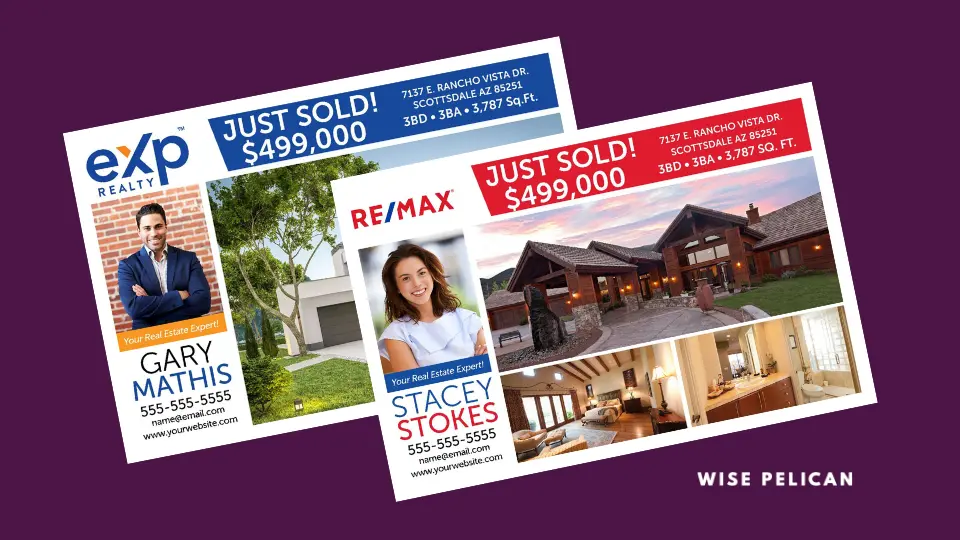
Reaching Beyond Social Media
Direct mail campaigns can be a powerful tool for real estate agents to promote their listings and engage with potential buyers.
Agents can expand their reach even more by sharing the same images and content used in direct mail on social media platforms like Facebook. This multi-channel approach maximizes exposure and ensures the message reaches a broader audience.
When creating direct mail campaigns, agents can utilize a variety of postcard images tailored to different stages of the real estate process.
For example, Coming Soon postcards can generate excitement and anticipation among potential buyers before a property is officially listed.
Just Listed postcards effectively announce new properties on the market, while Just Sold postcards showcase successful transactions and build credibility.
Open House postcards invite interested parties to view a property in person, while Under Contract postcards provide updates on properties that are in the process of being sold.
BROWSE WISE PELICAN’S REAL ESTATE POSTCARDS
By consistently sharing these postcard images on Facebook and other social media platforms, agents can keep their audience informed about their latest listings and engage with potential buyers in a visually compelling way. These proof-of-production postcards, used on Facebook, allow your audience to feel confident in your skills.

The Importance of Public Persona on Facebook for Real Estate Agents
As a real estate agent on Facebook, it’s essential to understand how your profile changes from personal to a marketing platform for your business. Your Facebook presence shows your brand and who you are professionally, so it’s crucial to use it well.
One fundamental aspect of optimizing your Facebook strategy is ensuring that your posts are set to “public.”
By making your content accessible to anyone, you open the door to a wider audience, including potential clients and industry connections. This transparency enhances your visibility and increases the chances of your posts being shared and reaching a broader network.
It’s important to review your existing Facebook content carefully. Your profile should demonstrate your expertise and commitment to real estate, so it’s crucial to manage it accordingly.
Take the time to evaluate each post and remove any content that may not align with your professional image or business goals. This could include personal anecdotes, irrelevant updates, or anything else that detracts from your professional credibility.
Maintaining a polished and focused Facebook presence reinforces your reputation as a reliable and knowledgeable real estate professional. Consistency in your branding and messaging across all platforms, including social media, strengthens your overall brand identity and encourages trust with your audience. Use your Facebook profile as a strong marketing tool to show your expertise, attract clients, and grow your business.
Facebook Tips for Real Estate Agents
As you start Facebook for your real estate business, we have compiled some tips to help you get started.
Hashtags
Think of hashtags as adding road signs to your posts and directing interested buyers and sellers straight to your listings. Agents can expand their reach beyond their usual circle by sprinkling hashtags related to locations, property types, or features.
Using trending hashtags can put your posts in front of even more potential clients.
You may be wondering how you find popular hashtags. The easiest and most effective way is to type in your hashtag. Facebook will display the words or terms’ performance metrics. Be sure to use some lower-volume but still relevant hashtags. Only using high-volume hashtags puts you in competition with thousands of other users, while using low-volume hashtags puts you in front of a smaller audience, but an audience that is more likely to be a match for your page.
Facebook Live
Facebook Live is a great place to offer live virtual tours, allowing your audience to ask questions about the property in real time. This is also a fantastic platform for your Q&A sessions.
Facebook Live’s algorithm often prioritizes live content, which maximizes your exposure and gives you a better chance to appear in your followers’ feeds.
Create Posts for Engagement
It’s necessary to post proof-of-production on your Facebook page. However, your audience must know you. Create posts that people will want to comment on.
Engage your audience with interactive polls or surveys related to real estate preferences, local trends, or community interests, encouraging participation and dialogue.
By incorporating various content ideas into your Facebook strategy, you can keep your audience engaged, informed, and interested in your real estate business.
You should also actively engage in the post thread. This allows your audience to get to know you, and people want to list their homes or buy from someone they know.
Host Giveaways
Hosting giveaways can be a highly effective strategy. Giveaways are an excellent way to increase engagement and attract new followers to your page. Everyone loves the opportunity to win something. Giveaways incentivize your followers to like, comment, and share your content. This is an excellent way for REALTORS to showcase their brand and services to a broader audience.
Direct Mail and Facebook: A Winning Combination
Proof-of-production real estate postcards can powerfully complement your social media efforts and create deeper connections within your community.
When mailed, these postcards, showcasing your recent successes and milestones in real estate transactions, provide tangible evidence of your expertise and reliability.
Sharing these postcards on Facebook and other social media platforms allows you to amplify their impact and reach a wider audience.
Wise Pelican is here to assist if you are ready to enhance your marketing efforts. We offer custom real estate postcards designed to yield high conversion rates, ensuring you get the best response possible. Utilize our Express Editor to personalize one of our impressive templates, or upload your own design.
